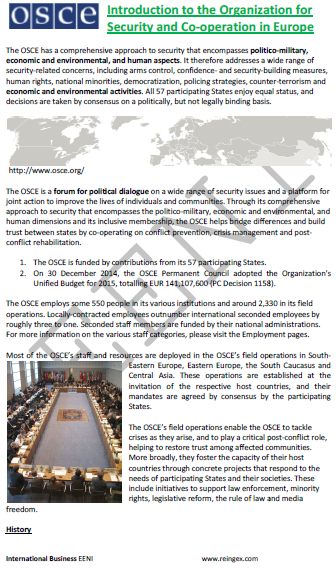Organization for Security and Cooperation in Europe (OSCE)
OSCE Economic Cooperation: regional integration, transport, border procedure

The Organization for Security and Cooperation in Europe (OSCE) works on several areas: political, military, environmental, economic development, democratization, counterterrorism actions, conflict prevention, human trafficking, and border management.
- Introduction to the Organization for Security and Cooperation in Europe (OSCE)
- Main activities of OSCE
- Member countries of the Organization for Security and Cooperation in Europe
Organization for Security and Cooperation in Europe (OSCE)


The Subject “Organization for Security and Cooperation in Europe (OSCE)” is included within the curriculum of the following academic programs at EENI Global Business School:
Masters: International Business, Foreign Trade.


Languages: 
 Organización para la Seguridad y la Cooperación en Europa (OSCE)
Organización para la Seguridad y la Cooperación en Europa (OSCE)  Organization pour la sécurité et la coopération en Europe (OSCE).
Organization pour la sécurité et la coopération en Europe (OSCE).
Organization for Security and Cooperation in Europe (OSCE).
In 1973 was founded the Organization for Security and Cooperation in Europe (OSCE) as a forum for political dialogue.
In the economic area, OSCE works on strength the regulatory frameworks, regional integration, transport networks, border crossing procedures, PPP (public-private partnerships) development, and the business climate improvement.
The Headquarters are in Vienna (Austria).
The main institutions of the Organization for Security and Cooperation in Europe (OSCE) are:
- OSCE Parliamentary Assembly
- High Commissioner on National Minorities (HCNM)
- Office for Democratic Institutions and Human Rights
- OSCE Secretariat
- Minsk Group
OSCE
member countries are:
1- Europe:
- The European Union (UE) countries are Austria, Belgium, Bulgaria, Croatia, Cyprus, the Czech Republic, Denmark, France, Estonia, Finland, Germany, Greece, Hungary, Ireland, Italy, Latvia, Lithuania, Luxembourg, Malta, the Netherlands, Poland, Portugal, Romania, Slovakia, Slovenia, Spain and Sweden
- United Kingdom
- The Non European Union countries are Albania, Andorra, Armenia, Bosnia and Herzegovina, Belarus, Georgia, Holy See, Iceland, Liechtenstein, Macedonia, Monaco, Moldova, Montenegro, Norway, Serbia, Switzerland, San Marino, Turkey, and Ukraine
2- Asia: Azerbaijan, Kazakhstan, the Kyrgyz Republic, Mongolia, Tajikistan, Turkmenistan, and Uzbekistan.
3- North America: Canada, the United States.

(c) EENI Global Business School (1995-2025)
Top of this page









 WhatsApp
WhatsApp